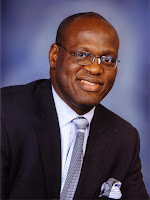 Meet Wale Babatunde...senior pastor of the World Harvest Christian Centre.
Meet Wale Babatunde...senior pastor of the World Harvest Christian Centre. This man delivered this evening's 4thought on Channel 4, which can be viewed here:
I was left disappointed by this thought. The man seemed to imply that homosexuals were equivalent to thieves. (Perfectly logical I suppose, the one takes people's possessions, destroys their trust in humankind and leaves them in despair; the other is attracted to and falls in love with people of their own gender).
But the main reason I was left so disappointed with this 4thought was that, ironically and unfortunately, there simply wasn't any thought involved in it. Pastor Babatunde made the hideously fallacious statement that:
"The issue...should not be a matter of personal interpretation; the most important think is to look at what the Bible says"
How compelling Pastor Babatunde...how easily one would be inclined to agree with you. After all, who are Christians to consider themselves above the Bible?
Except...looking at what the Bible says is a matter of personal interpretation. Of course it is. Everything one reads, to some extent, one interprets. And there are a plethora of interpretations of scriptural passages: literal, allegorical, historical, purely contextual, universal.
No prizes for guessing how Pastor Babatunde thinks scripture should always be interpreted.
He then goes on to quote 1 Corinthians 6:9, which in his translation says:
Do you not know that the unrighteous will not inherit the kingdom of God? Do not be deceived; neither fornicators, nor idolaters, nor adulterers, nor homosexuals, nor sodomites...
So, the uninformed listener may assume from this that the Apostle Paul said homosexuals cannot inherit the kingdom of God, and therefore homosexuality is wrong.
What a depressingly narrow interpretation.
The Apostle Paul, factually speaking, did not say that homosexuals will not inherit the kingdom of God. Why not? Because the word homosexual, a Greek and Latin hybrid, was first used in 1869. And, unless I am very much mistaken, St Paul was writing in the first, rather than the nineteenth, century of the Common Era.
So, what words did he use? The words, in Greek, were: malakoi and arsenokoitai.
The first, malakoi, is the plural of the adjective 'soft'. (In Greek, as in many other classical languages, adjectives could be used as nouns). So, the literal translation is 'soft ones'. It may seem that Paul is obviously talking about homosexuals, but this is by no means clear. In fact, the term had in the past been used to refer to some heterosexuals. Early church fathers had used the term against masturbation.
The rendering of the term as 'effeminate', as some translations suggest, is closer, but is still very much based on assumptions. There were in fact other terms that were used instead for effeminacy, such as androgune (from man and woman) and thelubrios.
The meaning of the second term is equally by no means clear. It is highly problematic, for the term was first found to be used by Paul, and was not frequently used after him. Some translations render the term to refer to child molesters. If this is the case, it shows that there are grave problems with generalising the term to refer to all who practise sodomy.
So, it seems, that 1 Corinthians 6:9 does not obviously condemn homosexuals at all.
I do not doubt that Mr Babatunde believes he is preaching a message which God wishes him to preach. But I do not for a second believe that he has that message correct. And it's this sort of careless talk that leads to all sorts of assumptions being made and thousands of people being outcast by the church and made to feel dirty, evil and in many cases suicidal.
And those were exactly the sorts of people whom Jesus reached, and reaches, out to in love.

No comments:
Post a Comment